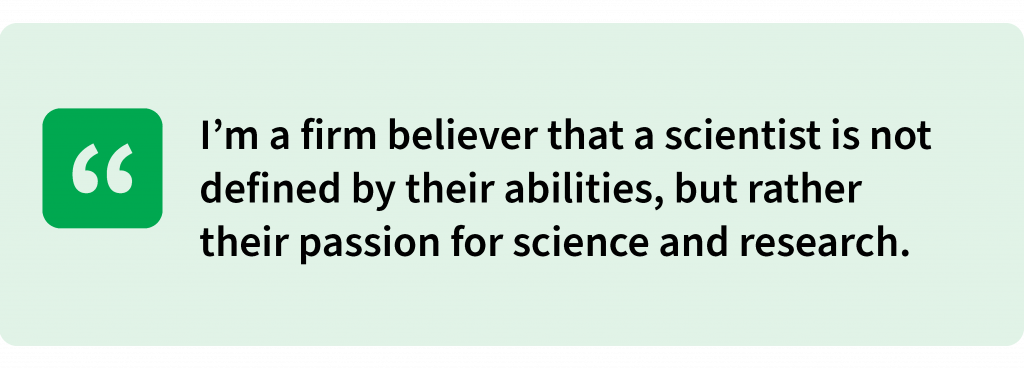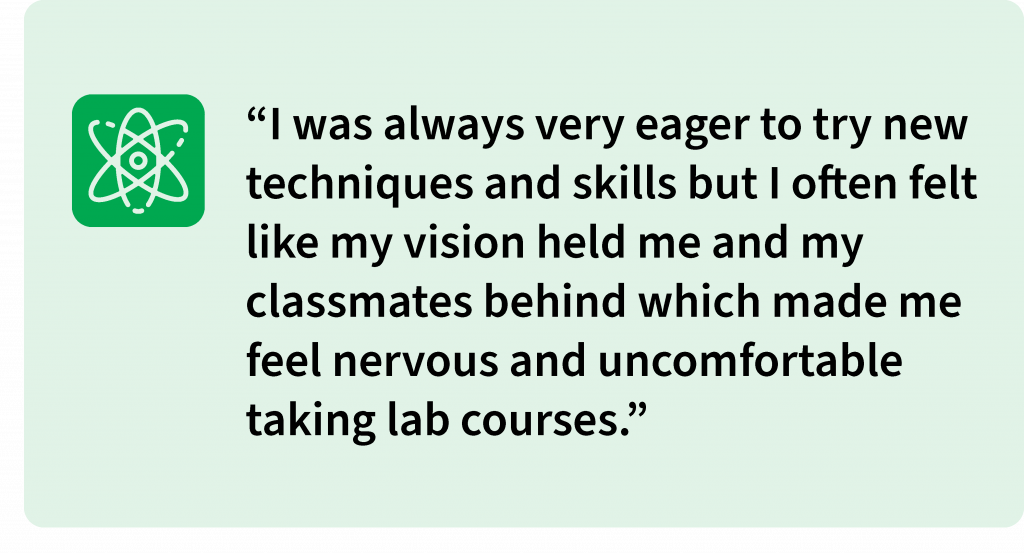9 Navigating a Teaching Lab as a Visually Impaired Student

By Océanne Comtois
 Being visually impaired in a lab setting can be extremely challenging at times. While there are many types of visual impairments, my visual impairment impacts my depth perception, my ability to see objects from far, and small objects. Additionally, it is extremely difficult for my eyes to focus on what I’m looking at, which leads to eye fatigue and a lack of coordination skills. Following visual demonstrations, working with small concentrations, activities that require precision, or noticing minor details can be difficult for me, and unfortunately, can lead to negative experiences in the lab or even affect my academic performance in the course. I was always very eager to try new techniques and skills but I often felt like my vision held me and my classmates behind which made me feel nervous and uncomfortable taking lab courses.
Being visually impaired in a lab setting can be extremely challenging at times. While there are many types of visual impairments, my visual impairment impacts my depth perception, my ability to see objects from far, and small objects. Additionally, it is extremely difficult for my eyes to focus on what I’m looking at, which leads to eye fatigue and a lack of coordination skills. Following visual demonstrations, working with small concentrations, activities that require precision, or noticing minor details can be difficult for me, and unfortunately, can lead to negative experiences in the lab or even affect my academic performance in the course. I was always very eager to try new techniques and skills but I often felt like my vision held me and my classmates behind which made me feel nervous and uncomfortable taking lab courses.
 In addition to the physical barriers, the laboratory classroom presented many other social barriers that were difficult to navigate. I’ve had difficult situations with professors and teaching assistants where I was purposefully excluded from activities, private information about my disability was disclosed publicly to my classmates, and hurtful and offensive statements or false assumptions were made about my abilities. Although these instances were resolved appropriately, it was arguably these experiences that have impacted me the most and have made me feel apprehensive about taking more laboratory courses as well as continuing my studies and career in science.
In addition to the physical barriers, the laboratory classroom presented many other social barriers that were difficult to navigate. I’ve had difficult situations with professors and teaching assistants where I was purposefully excluded from activities, private information about my disability was disclosed publicly to my classmates, and hurtful and offensive statements or false assumptions were made about my abilities. Although these instances were resolved appropriately, it was arguably these experiences that have impacted me the most and have made me feel apprehensive about taking more laboratory courses as well as continuing my studies and career in science.
Despite these few experiences I’ve had a generally positive experience with my professors who were always eager to help accommodate and make me feel welcome in their classroom. “By maintaining an open and honest line of communication, we were able to find different ways to evaluate my performance in the practical components of the lab” By maintaining an open and honest line of communication, we were able to find different ways to evaluate my performance in the practical components of the lab such as setting up similar yet different evaluation criteria taking into consideration my limitations, allowing someone else to do manipulations in the lab while I give oral instructions, ensuring that all instructions are given before the class and that demonstrations are written and described in detail, letting me tour the lab and get familiar with my environment at the very beginning of the semester, and clearly communicating the objectives of the course so that I can troubleshoot any possible problems that may occur throughout the semester.
I’m a firm believer that a scientist is not defined by their abilities, but rather their passion for science and research, which is why I think it is crucial that we find ways to make science inclusive to people with disabilities not only through accommodations in the classroom but by redefining the way we perceive disability.

